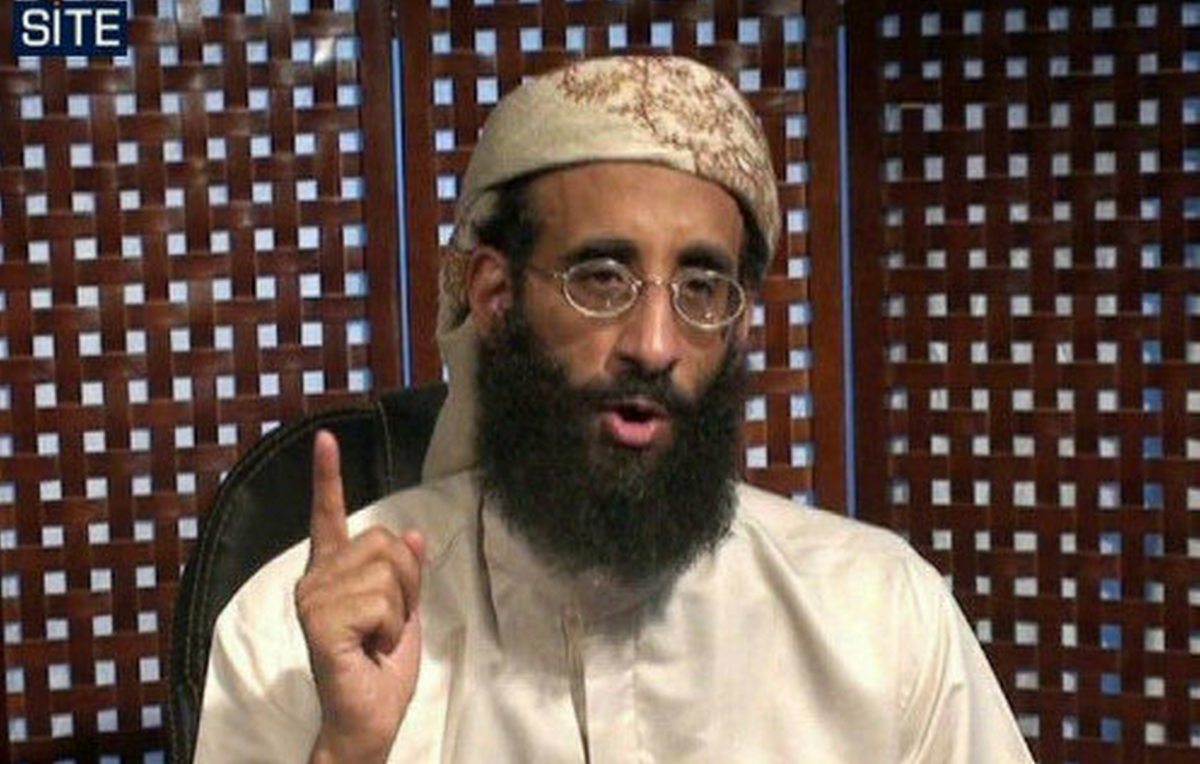Memo justifying drone killing of American Al Qaeda leader is released

- Share via
Reporting from Washington — Neither the U.S. Constitution nor laws governing prosecution of people who commit murder abroad prohibited killing American citizen Anwar Awlaki in Yemen, according to a previously secret Justice Department memo released by a federal court Monday.
Although the existence of the memo, written in 2010 to justify Awlaki’s 2011 death by U.S. drone strike, has long been known, its precise legal reasoning had been shrouded in secrecy. The ACLU and the New York Times sued for its release.
The redacted memo by former Obama Justice Department official David Barron is highly unusual in that it advocated allowing the killing of a U.S. citizen without due process of law.
Barron, recently confirmed by the Senate as a federal appeals court judge in Boston, concluded that Awlaki could be killed as a leader of Al Qaeda in the Arabian Peninsula actively plotting attacks against the U.S. and its allies. But the memo said there was no precedent for it, nor was there explicit authorization in federal statutes or the Constitution.
The memo authorized the U.S. military or the CIA to carry out a strike against Awlaki as long as they gave assurances there was no alternative.
“In the present circumstances, as we understand the facts, the U.S. citizen in question has gone overseas and become part of the forces of an enemy with which the United States is engaged in an armed conflict; that person is engaged in continual planning and direction of attacks upon U.S. persons from one of the enemy’s overseas bases of operations; the U.S. government does not know precisely when such attacks will occur; and a capture operation would be infeasible,” Barron wrote.
“At least where, as here, the target’s activities pose a ‘continued and imminent threat of violence or death’” to Americans, the killing would be considered a lawful act of war, the memo concluded.
In such circumstances, “the Constitution would not require the government to provide further process” such as advance notice or a court hearing before carrying out a deadly strike.
The memo was released by the U.S. 2nd Circuit Court of Appeals in New York under the Freedom of Information Act. The court ruled the administration had waived any right to secrecy by talking publicly about the memo and the legal justifications within it.
Anwar Awlaki was born in New Mexico to Yemeni parents, and the family moved to Yemen when he was 7. He returned to the U.S. for college and graduate school, eventually becoming an imam, or Islamic teacher, in mosques in San Diego and Falls Church, Va., where he preached to three of the Sept. 11 hijackers.
He returned to Yemen after the Sept. 11 attacks and became a principal propagandist for an Al Qaeda affiliate there, editing a magazine and releasing videos in English to inspire Western radicals.
The memo indicates that the government believed Awlaki had moved beyond propaganda to actually planning attacks, but the first 10 pages, where the evidence for that assertion was apparently discussed, was redacted in the interest of national security.
The drone strike that killed him was carried out by the military.
Jameel Jaffer, the ACLU lawyer who filed the suit, hailed the memo’s release but called its contents “disturbing ... ultimately an argument that the president can order targeted killings of Americans without ever having to account to anyone outside the executive branch.”
“It’s a very broad claim of authority,” Jaffer said in an interview. “It makes the claim that targeted killings of American terrorist suspects [is justified] without geographic limitations and without presenting evidence to any court.”
Awlaki is one of four U.S. citizens killed in drone attacks. The others are Samir Khan, who was not a target but who died in the same strike as Awlaki; Awlaki’s son, Abdulrahman, who died in another strike; and Jude Kenan Mohammad, who was killed in a U.S. drone strike in Pakistan’s tribal region.
The battle for release of documents about the targeted-killing program is ongoing. Under the appeals court ruling, a federal District Court judge in New York will preside over arguments about other memos, including two by Barron, who wrote them as the acting head of the Justice Department’s Office of Legal Counsel.
The ACLU is particularly interested in obtaining from the government an index of additional documents pertaining to the program, which would allow it to greatly expand the number of documents it is seeking. The appeals court has yet to rule on that issue.
More to Read
Sign up for Essential California
The most important California stories and recommendations in your inbox every morning.
You may occasionally receive promotional content from the Los Angeles Times.












